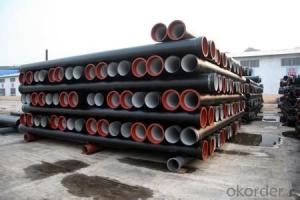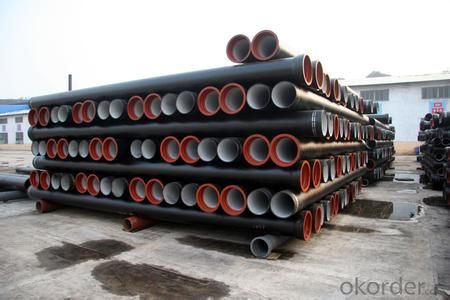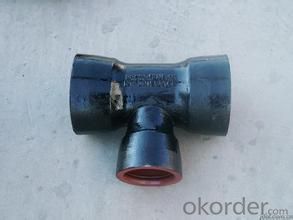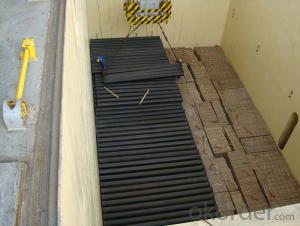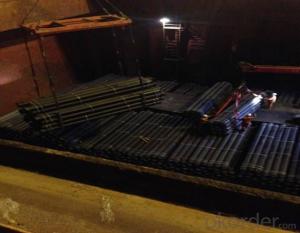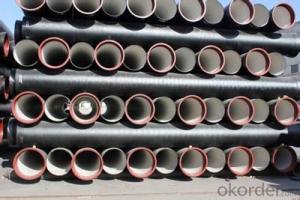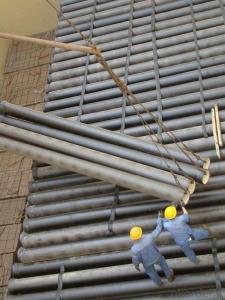DUCTILE IRON PIPE K9 CLASS DN600
- Loading Port:
- Tianjin
- Payment Terms:
- TT OR LC
- Min Order Qty:
- 32 pc
- Supply Capability:
- 3000 pc/month
OKorder Service Pledge
OKorder Financial Service
You Might Also Like
· Material : Ductile Cast Iron
· Size Range : DN 80mm to DN 2000mm
· Unit Effective Length : 6m or 5.7m
· Manufacture Standard: ISO 2531:1998/ EN 545:2006/EN 598:2007
· Annual capacity : 200,000 tons
· Coating Exterior: Zinc 130g/m2 according to ISO 8179-1 and bitumen coating 70 microns.
· Cement Interior: Portland Cement/ High Alumina Cement/ Sulphate Resisting Cement Lining according to ISO 4179
· Special requirements on external coating and internal lining can be applied
· We also provide accessories such as SBR/EPDM rubber gaskets, lubricant paste, pipe caps, PE sleeves, etc.
Additional Parts:
Each pipe is strictly inspected according to related standard to ensure permanently high performance.
Easy Installation at site and service free for life
Long Service Lifespan
Quotation will arrive you within 24hours once we get your inquiry.
We guarantee offering you a competitive price.
A copy of original inspection reports of pipes will be offered after shipment.
Photos of loading process will be sent to the customer after shipment effect.
We will follow-up the delivery progress after shipment effect and update to the customer on weekly basis.
- Q: How are ductile iron pipes protected against mechanical damage?
- Ductile iron pipes are protected against mechanical damage through various measures. One common method is the application of protective coatings on the external surface of the pipe. These coatings, such as epoxy or polyethylene, provide a barrier against abrasion and impact, reducing the risk of mechanical damage. Additionally, ductile iron pipes are often installed with proper bedding and backfill materials, ensuring a stable and supportive environment that minimizes the potential for external forces to cause damage. Furthermore, the pipes can be designed with thicker walls or ribs to enhance their resistance to mechanical stress. Overall, a combination of protective coatings, appropriate installation techniques, and structural design considerations helps safeguard ductile iron pipes against mechanical damage.
- Q: Are ductile iron pipes prone to external corrosion?
- External corrosion is not typically a concern for ductile iron pipes. This is because the material itself has protective properties. Ductile iron pipes are composed of a durable and strong material with a significant amount of graphite. The graphite serves as a natural barrier against external corrosion, effectively preventing rust and oxidation. Furthermore, ductile iron pipes are often coated with a layer of protection, such as cement mortar or polyethylene, to further enhance their resistance to corrosion. These coatings provide an additional safeguard, preventing contact between the pipe and any corrosive substances in the environment. It is important to note, however, that localized corrosion may still occur under certain conditions. Factors such as soil composition, moisture levels, and the presence of specific chemicals can potentially lead to the corrosion of ductile iron pipes in specific areas. Therefore, regular inspections and proper maintenance are necessary to promptly identify and address any potential corrosion concerns. In conclusion, ductile iron pipes are generally highly resistant to external corrosion. Nonetheless, like any other material, they require appropriate care and maintenance to ensure their long-term durability and reliability.
- Q: Can ductile iron pipes be used in nuclear power plants?
- Ductile iron pipes are suitable for use in nuclear power plants due to their improved flexibility and strength compared to traditional cast iron pipes. They are known for their durability, resistance to corrosion, and ability to withstand high pressure and temperature conditions. These pipes are a reliable and robust choice for transporting water, coolant, and other fluids in nuclear power plants. However, it is crucial to consider the specific requirements and regulations of each power plant before selecting the pipe material. It is necessary to ensure proper testing, certification, and compliance with nuclear industry standards to guarantee the safe and efficient operation of the power plant.
- Q: Can ductile iron pipes be used for irrigation canal lining?
- Yes, ductile iron pipes can be used for irrigation canal lining. Ductile iron pipes are known for their strength, durability, and resistance to external pressure and impact. These qualities make them suitable for use in irrigation canal lining, as they can withstand the harsh conditions of the environment such as high water pressure, soil movement, and exposure to chemicals and corrosive elements. Ductile iron pipes also have a smooth interior surface, which allows for efficient water flow and reduces the risk of clogging or sediment buildup. This is important for irrigation canals, as it ensures a continuous supply of water to the crops or plants being irrigated. Additionally, ductile iron pipes are highly resistant to damage from external factors such as roots, rocks, or other objects that may come into contact with the canal lining. This helps to minimize the risk of leaks or breaks in the irrigation system, ensuring a reliable and efficient irrigation process. It is worth noting that the selection of ductile iron pipes for irrigation canal lining should take into account factors such as the size and capacity of the canal, the water pressure requirements, and the specific conditions of the irrigation project. Consulting with a professional engineer or irrigation specialist can help determine the most suitable materials for the specific requirements of the project.
- Q: What is the use of ductile iron?
- As far as the tonnage is concerned, the automotive industry is the second largest producer of ductile iron castings, with the largest number of them. Ductile iron is used in three main parts of automobiles: (1) power source, engine parts; (2) power transmission of a gear train, gears and bushings; (3) vehicle suspension, brakes and steering gear. The power source is subjected to continuous change of the crankshaft bending, torsion and shear load, and in its service life, to one billion cycles of car design engineers early in the 19152 years that the processing method for magnesium found in four years later, immediately consider the possibility of using ductile iron. Almost all crankshafts of Ford motor are made of this material. Most gasoline engines in the world are fitted with ductile iron crankshafts instead of forged steel crankshafts, which are considered a typical example of value engineering.
- Q: What is the ductile cast iron pipe
- Have not heard of the nodular cast iron pipe pipe, ductile iron may be a tube or a certain short tube is referred to as excellent grade.
- Q: Some questions about the bearing capacity of nodular cast iron pipes!
- But the key is that the cast iron pipe needs centrifugal casting, especially the longer tube. Therefore, we must understand whether the production plant has this production condition, otherwise, the higher quotation may not be able to produce.
- Q: Can ductile iron pipes be used for bridge crossings?
- Ductile iron pipes are indeed suitable for bridge crossings. This material is widely used in various applications, such as water and wastewater systems, due to its strength and durability. When it comes to bridge crossings, ductile iron pipes offer numerous advantages. They possess high tensile strength, enabling them to handle the load and stress imposed by the bridge structure. In addition, they are highly resistant to corrosion, making them well-suited for environments where bridges may be exposed to moisture and other harsh conditions. Moreover, ductile iron pipes have the capability to withstand seismic activity, making them a dependable choice for areas prone to earthquakes. Overall, ductile iron pipes are a reliable and appropriate option for bridge crossings due to their strength, durability, resistance to corrosion, and ability to withstand seismic activity.
- Q: How do ductile iron pipes perform in high-traffic areas?
- Due to their inherent strength and durability, ductile iron pipes exhibit exceptional performance in high-traffic areas. The composition of these pipes includes graphite nodules, which impart them with their characteristic ductility. This ductility enables the pipes to flex and endure heavy loads and vibrations caused by traffic without experiencing any cracks or breaks. In areas with high traffic, where the ground is constantly in motion and subjected to heavy vehicle loads, ductile iron pipes demonstrate superior resistance to stress and impact. Their capacity to absorb and distribute the pressure from traffic ensures that these pipes maintain their structural integrity over time. This aspect is particularly significant since any damage or failure in a pipe system can lead to expensive repairs and disruptions in the water supply. Moreover, ductile iron pipes possess a high level of resistance to corrosion, making them suitable for installation in high-traffic areas exposed to diverse environmental conditions. Typically, these pipes are lined with a protective layer, such as cement mortar or epoxy, which provides an additional barrier against external factors. This resistance to corrosion guarantees the longevity of the pipes and reduces the need for frequent maintenance or replacement. Furthermore, ductile iron pipes exhibit excellent flow characteristics, enabling efficient water distribution even in areas with high traffic demands. The smooth interior surface of these pipes minimizes friction and pressure losses, ensuring a consistent and reliable water supply to meet the needs of the surrounding population. In conclusion, ductile iron pipes are a reliable and robust choice for high-traffic areas. Their strength, durability, resistance to corrosion, and efficient flow characteristics make them well-suited to withstand the demands and challenges posed by heavy traffic. They guarantee the continuous supply of water without compromising the structural integrity of the pipe system.
- Q: Can ductile iron pipes be used for firefighting systems?
- Yes, ductile iron pipes can be used for firefighting systems. Ductile iron is a strong and durable material that can withstand high pressures and extreme temperatures, making it suitable for transporting water in firefighting systems. Its ability to resist corrosion and withstand external loads also ensures the long-term reliability and performance of the pipes. Additionally, ductile iron pipes have excellent fire resistance properties, as they do not burn, emit toxic fumes, or contribute to the spread of fire. Therefore, ductile iron pipes are a reliable and commonly used choice for firefighting systems due to their strength, durability, and fire resistance.
Send your message to us
DUCTILE IRON PIPE K9 CLASS DN600
- Loading Port:
- Tianjin
- Payment Terms:
- TT OR LC
- Min Order Qty:
- 32 pc
- Supply Capability:
- 3000 pc/month
OKorder Service Pledge
OKorder Financial Service
Similar products
Hot products
Hot Searches
Related keywords
